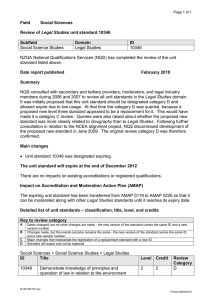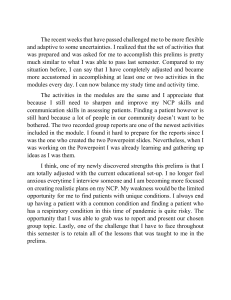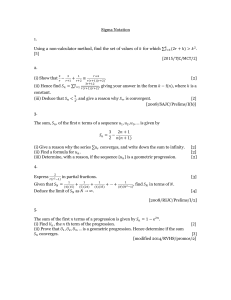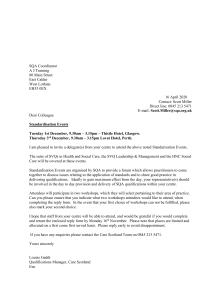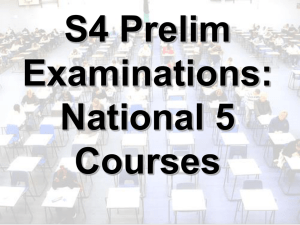S4 to S5 Induction PUPILS
advertisement
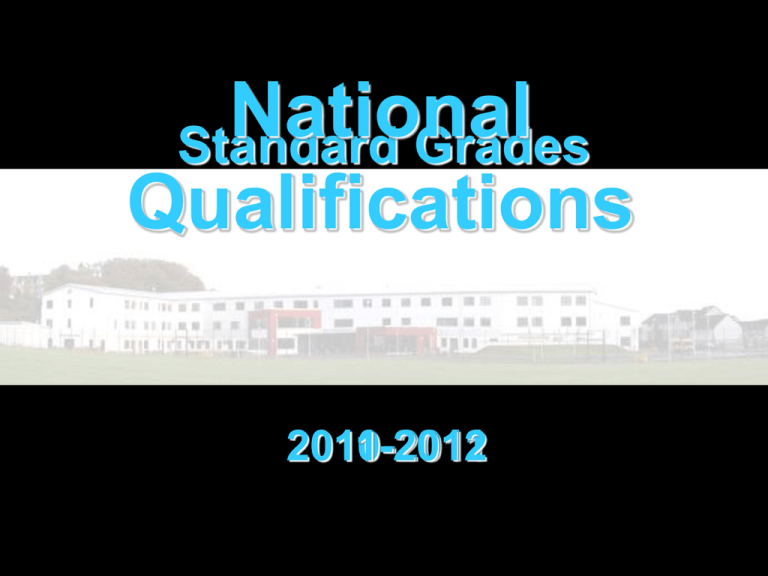
National Standard Grades Qualifications 2011-2012 2010-2011 How are NQs different? • • • • • • • Units Final Exam MUCH harder MUCH more expected of you 1 year course instead of 2 year course In reality … 30 weeks in school – So if you miss June you miss more than 10% of the course! • NQs are grown-up qualifications for grownups! Pathways • Credit HIGHER • General INTERMEDIATE 2 • Foundation INTERMEDIATE 1 … but there are sometimes exceptions because NQ courses are VERY different from Standard Grades Units and the external exam • Most subjects have three or four units • Each unit has one, two or more “unit assessments” which you MUST pass to get through the course • The final exam tests the whole course • To get an award you have to – Pass all the units – Pass the final exam An example - Geography • Unit 1 – Environmental Interactions • Unit 2 – Human Environments • Unit 3 – Physical Environments • Prelims • Final Exam The final exam 70% = A 60% = B 50% = C 45% = D <45% = No Award Incomplete Taking responsibility As you get older you need to take more responsibility for your work. Education is not about just receiving information and explanations. You must be actively involved in your own learning! Coping with the demands … some factors to consider … • How much work are you prepared to do per subject? • SQA recommendation is 3 hours per subject per week! • What might get in the way of that? Hobbies? Work? Social Life? • Decisions need to be made! • More about this during the Induction days S5 How much do you need to change? STAFF SURVEY A – The year group are ready to take on the challenges of S5 3.7% B – The year group will need to make some minor improvements in their study habits to meet the challenge of S5 29.6% C – The year group will need to make major improvements in their study habits to meet the challenge of S5 66.7% What will help you to succeed? • • • • • • • • Target setting (and the steps along the way) Class teaching Feedback Peer and self assessment Private Study periods Additional classes Parents evenings Personal support – In school – At home Tracking • Target agreed with teacher – a grade (A, B or C) based on previous attainment • Progress against target checked through the year • Advice about getting back on track or moving ahead of target • Involvement of parents/carers • Emphasis is on YOU keeping on track! • But the key point is how you plan the journey from where you are now to the point where you reach your target grade. Tracking • November – check how you are getting on as you work towards your target. Parents informed. • January/February – prelims. Report card issued to parents. • March – a final check on how you are getting on as you work towards your target. Parents informed. Tracking – stages on the journey Higher Chemistry Typical Progress in A Grade Students in Higher English Higher English 80 70 60 70 60 50 60 50 40 40 50 40 30 30 30 20 20 20 10 10 10 0 0 0 August February May August August February February May May The Pupil Experience • What is it actually like to move from S4 into S5? • Cameron and Ruth Conclusion • You have a busy year ahead. That is your challenge. • The key person in terms of your success is YOU but you are in partnership with the school and your family. • You need to be – Organised – Clear about how to progress – Hard-working – Responsible – Committed to improvement – Resilient How Will You Cope? • The only thing that overcomes hard luck is hard work. ~ Harry Golden (an American writer) • If you have made mistakes, even serious ones, there is always another chance for you. What we call failure is not the falling down but the staying down. ~ Mary Pickford ( a Canadian actress)
